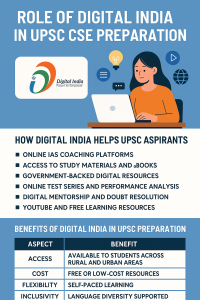14 May Role of Digital India in UPSC CSE Preparation
Role of Digital India in UPSC CSE Preparation
India’s flagship initiative Digital India has revolutionized how aspirants prepare for the UPSC Civil Services Examination (CSE). From remote access to top faculty via live classes to downloading NCERTs with a click, UPSC aspirants are among the biggest beneficiaries of this digital transformation.
What is Digital India?
Digital India is a Government of India campaign launched in 2015 to transform India into a digitally empowered society and knowledge economy. It promotes internet connectivity, e-governance, digital infrastructure, and digital literacy across the nation. These initiatives have drastically enhanced the availability and accessibility of education, especially for competitive exams like UPSC.
How Digital India Helps UPSC Aspirants
Let’s explore how the Digital India mission has changed the game for UPSC preparation:
1. Online IAS Coaching Platforms
Thanks to improved digital infrastructure, thousands of aspirants can now prepare from their homes using platforms like:
- Plutus IAS
- Vision IAS
- Unacademy
- BYJU’S
- The HinduZone
These platforms provide live classes, mentorship, doubt-solving sessions, and test series—all enabled by India’s growing internet ecosystem.
2. Access to Study Materials and eBooks
Digital India has made it easy to download important resources like:
- NCERT textbooks (via NCERT portal)
- Yojana and Kurukshetra magazines (on official websites)
- PIB updates and Government schemes
- Economic Survey and Union Budget PDFs

Role of digital media in UPSC CSE preparation
This saves cost and provides 24×7 access, especially for students in rural or underprivileged areas.
3. Government-Backed Digital Resources
The government has launched platforms under the Digital India initiative which help UPSC aspirants immensely:
- DIKSHA Portal: High-quality learning material for school and competitive exams
- ePathshala: NCERT books in regional languages
- National Digital Library of India (NDLI): Access to academic and reference books
- MyGov: Public policy updates and discussion forums
4. Online Test Series and Performance Analysis
Through platforms like Plutus IAS and Vision IAS, students take part in:
- Sectional and Full-length test series
- Real-time performance tracking
- AI-based performance analytics
This boosts exam readiness and helps identify weak areas instantly—something not possible in offline-only mode.
5. Digital Mentorship and Doubt Resolution
One-on-one mentorship is a key factor in clearing UPSC. Through digital initiatives, aspirants now get personal mentors through video calls, discussion forums, and chat-based apps—bringing quality guidance to every home.
6. YouTube and Free Learning Resources
Channels like PlutusIAS, YojnaIAS, and Mrunal have used Digital India’s reach to provide free content to lakhs of aspirants. Current affairs, economy, and lectures are freely accessible 24×7 to all.
7. Online Forms and Notifications
No more standing in long queues or missing deadlines! The UPSC Online Portal has simplified application processes, admit card downloads, and communication. This has increased transparency and ease for all candidates.
Benefits of Digital India in UPSC Preparation
| Aspect | Benefit |
|---|---|
| Access | Available to students across rural and urban areas |
| Cost | Free or low-cost resources reduce dependency on expensive books |
| Flexibility | Self-paced learning and class recordings help working aspirants |
| Inclusivity | Language diversity supported via regional content (Hindi, Tamil, etc.) |
| Updates | Daily news, editorials, and schemes delivered in real time |
Challenges That Remain
- Internet issues in remote locations
- Digital divide among students lacking smartphones or laptops
- Too much content can sometimes confuse new aspirants
Despite this, initiatives like BharatNet and smartphone penetration are rapidly narrowing this gap.
Conclusion
The vision of Digital India has turned a new page in the lives of UPSC aspirants. Whether it’s live coaching, test analysis, or instant access to policies and books, it has become a key enabler of quality preparation. With increasing government efforts and private innovation, the future of UPSC preparation is becoming more inclusive, flexible, and student-friendly.
Recommended Reads:




No Comments